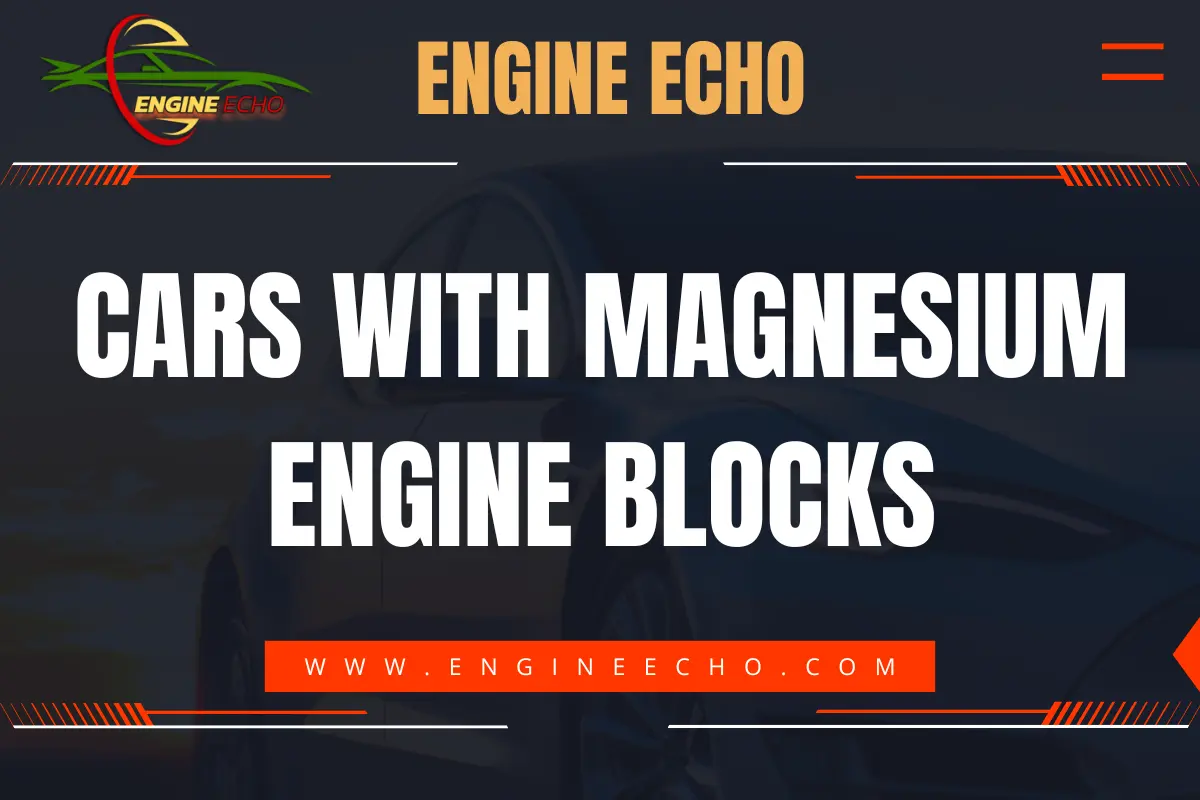Cars with Magnesium Engine Blocks

Key Takeaways
- Magnesium engine blocks offer significant weight reduction, leading to improved vehicle performance and fuel efficiency.
- While magnesium provides excellent heat dissipation, it also poses challenges such as corrosion and higher costs.
- Notable cars like the Porsche 917 and BMW 3 Series have utilized magnesium engine blocks, highlighting its potential in both racing and production models.
- Advances in magnesium alloy technology and its integration into electric vehicles (EVs) signal a promising future for this material in automotive engineering.
- Maintenance of magnesium engine blocks requires special attention to prevent corrosion and ensure long-term durability.
Introduction to Magnesium Engine Blocks in Cars
Brief History of Engine Materials
It’s fascinating to think how far we’ve come from the days when iron and steel were the standard for engine blocks. Those materials got the job done, but they were heavy and not exactly performance-friendly. The move towards lighter materials like aluminum was a game-changer, but when magnesium came into play, it really caught my attention. Magnesium had the potential to redefine what we thought was possible in automotive engineering, especially in the pursuit of better performance and efficiency.
What is Magnesium Alloy?
Magnesium alloy, in my opinion, is one of the most exciting developments in automotive materials. It’s a mix of magnesium with other metals like aluminum, zinc, and manganese, creating a metal that’s not just incredibly light but also strong. What really grabs me about magnesium is how this combination manages to provide a high strength-to-weight ratio, making it an ideal candidate for engine blocks. Plus, its ability to conduct heat efficiently and absorb energy during impact are added bonuses that make it all the more appealing for high-performance applications.
Advantages of Using Magnesium Engine Blocks
Weight Reduction
What really stands out about magnesium is just how light it is—it’s a total game-changer. Magnesium is about 75% lighter than steel and 33% lighter than aluminum. The first time I drove a car with a magnesium engine block, I could immediately feel the difference. It was more responsive, quicker off the line, and just an overall better driving experience. This weight reduction isn’t just about performance; it’s also about fuel efficiency, something I know we’re all increasingly mindful of these days. For anyone who values performance and efficiency, magnesium is a game-changer.
Improved Heat Dissipation
If you’ve ever driven a car hard and felt the engine struggle to cool down, you’ll appreciate what magnesium brings to the table. Its thermal conductivity is outstanding, meaning it dissipates heat much more effectively than other metals. From my experience, cars with magnesium blocks don’t just handle aggressive driving; they thrive on it, cooling down faster and performing better under pressure. This not only helps keep the engine at an optimal temperature but also extends its lifespan—a real win-win for any car enthusiast.
Environmental Benefits
Another aspect of magnesium that resonates with me is its environmental impact. The reduced weight of magnesium engine blocks leads to lower fuel consumption and, consequently, lower emissions. In a time when sustainability is more important than ever, using magnesium is a step in the right direction. I’m also encouraged by the fact that magnesium is abundant and easier to recycle compared to some other materials. It’s a forward-thinking choice that aligns with the industry’s move towards greener practices—something I wholeheartedly support.
Challenges and Drawbacks of Magnesium Engine Blocks
Corrosion Issues
But let’s be honest, magnesium isn’t without its quirks. One of the significant downsides is its vulnerability to corrosion, especially in environments exposed to saltwater or road salts used in winter. This has been a concern in my own experience, as it requires extra maintenance to ensure the engine block remains protected. That said, advances in coating technologies have made great strides in mitigating this issue, but it’s still something to consider if you’re thinking about opting for a car with a magnesium engine block.
Cost Implications
Cost is another factor that’s hard to overlook. Magnesium alloys are generally more expensive to produce than traditional materials like aluminum or steel. This is something I’ve seen firsthand, where vehicles with magnesium engine blocks tend to have a higher price tag. It’s a trade-off—you get superior performance and efficiency, but at a higher cost. Personally, I think it’s worth it for the benefits you gain, but it might not be the right choice for everyone, especially if you’re on a tight budget.
Structural Integrity
There’s also the issue of structural integrity. Magnesium is light, yes, but it’s not as strong as steel, which can be a concern for high-performance applications. I’ve noticed that while advancements in magnesium alloys have improved their strength, there’s still a gap compared to other materials. It’s an area that’s seeing a lot of research and development, and I’m optimistic that we’ll continue to see improvements, but it’s something to keep in mind when considering magnesium for engine blocks.
Notable Cars with Magnesium Engine Blocks
Porsche 917
I’ve always admired the Porsche 917, not just for its iconic status in racing history, but for how it pushed the boundaries of engineering. When I learned that its engine block was made from magnesium, it all made sense—this was a car built for speed and agility, and magnesium played a crucial role in achieving that. The 917 is a perfect example of how magnesium can be used to create a vehicle that’s not only powerful but also incredibly lightweight. For anyone passionate about motorsport, this is a shining example of magnesium’s potential.
BMW 3 Series (E21)
The BMW 3 Series (E21) holds a special place in my heart as one of the first production cars to feature a magnesium alloy engine block. I remember the first time I got behind the wheel of an E21—it was clear that the reduced weight made the car feel more nimble and responsive. BMW’s decision to use magnesium in this model was ahead of its time and demonstrated a commitment to innovation. If you’re looking for a car that blends performance with cutting-edge engineering, the E21 is a solid choice.
Volkswagen Beetle
The Volkswagen Beetle is a car that’s universally loved, and its use of magnesium in the engine design only adds to its charm. The Beetle’s engine case, made from a magnesium alloy, contributed to the car’s light weight and reliability—qualities that helped make it one of the most popular cars of all time. I’ve always appreciated how Volkswagen wasn’t afraid to innovate with materials, and the Beetle’s success shows that magnesium can be used effectively in mass-produced vehicles. It’s a testament to the material’s versatility.
Magnesium vs. Aluminum: A Comparative Analysis
Weight and Performance
When comparing magnesium and aluminum, the weight advantage of magnesium really stands out to me. Magnesium’s greater weight reduction directly translates to better performance, something I’ve experienced firsthand. The improved acceleration and handling are noticeable, especially in sports cars and high-performance vehicles. However, aluminum still has the upper hand in terms of widespread use, mainly due to its balance of lightness and strength. It’s a tricky decision, but if you’re the type who counts every ounce for performance, magnesium might just be your best bet.
Cost and Manufacturing
Magnesium is undoubtedly more expensive to produce and process than aluminum, which is why we don’t see it used as often. In my view, this cost factor is a significant hurdle, but one that’s slowly being addressed as production technologies advance. Aluminum’s lower cost and ease of manufacturing make it the go-to for most carmakers, especially in mass-market models. However, if you’re someone who values cutting-edge technology and performance, the investment in a magnesium engine block might be worth it.
Heat Resistance and Durability
Both magnesium and aluminum offer good thermal properties, but magnesium’s slight edge in heat dissipation is something I find particularly appealing. It’s especially beneficial in high-performance engines that generate a lot of heat. That said, aluminum’s durability and resistance to long-term stress make it a more reliable choice for everyday vehicles. If you’re looking for a balance between performance and longevity, aluminum might be the safer bet, but magnesium offers unique benefits that are hard to ignore.
The Future of Magnesium in Automotive Engineering
Emerging Technologies
The future of magnesium in automotive engineering is something I’m genuinely excited about. Recent advancements in magnesium alloy technology are addressing many of the material’s traditional drawbacks, like corrosion and structural integrity. These new alloys are more robust and corrosion-resistant, making magnesium a more viable option for future automotive applications. As someone who’s always on the lookout for the next big thing in car technology, I believe magnesium will play a significant role in the future of automotive design.
Magnesium in Electric Vehicles (EVs)
The rise of electric vehicles (EVs) presents a fantastic opportunity for magnesium. The weight savings that magnesium offers can extend the range of EVs, making them more efficient and appealing to consumers. I’m particularly interested in ongoing research exploring how magnesium can be integrated into EVs, not just in engine blocks but also in battery enclosures and other critical components. For those considering an EV, keep an eye out for models that incorporate magnesium—it could make all the difference in performance and range.
Industry Perspectives
From what I’ve seen and heard, there’s a growing optimism within the automotive industry about the future of magnesium. Experts agree that as the industry continues to prioritize fuel efficiency and reduced emissions, the demand for lightweight materials like magnesium will only increase. While there are still challenges to overcome, I’m confident that magnesium engine blocks will become more common in the next generation of vehicles. It’s an exciting time for car enthusiasts and engineers alike.
Case Studies of Magnesium Engine Blocks in Modern Cars
Case Study: Aston Martin V12 Vantage
I’ve always admired Aston Martin for their commitment to blending performance with luxury, and the V12 Vantage is no exception. This modern sports car incorporates magnesium in its engine design, which I believe significantly enhances its performance. The V12 Vantage is a prime example of how modern automotive engineering is leveraging magnesium’s advantages to create high-performance vehicles. If you’re a fan of cars that combine power with elegance, the V12 Vantage is definitely worth a closer look.
Case Study: Chevrolet Corvette
The Chevrolet Corvette has long been synonymous with American muscle, and its use of magnesium in various engine components, including engine blocks, is a testament to its innovation. I’ve found that the magnesium components play a crucial role in reducing weight and enhancing performance, making the Corvette a formidable contender in the sports car market. If you’re in the market for a high-performance vehicle, the Corvette’s use of magnesium is a significant selling point that should not be overlooked.
Environmental and Economic Impact of Magnesium Engine Blocks
Magnesium Production and Mining
When it comes to environmental impact, magnesium has a relatively low footprint compared to other metals like aluminum. I’ve looked into the production process, and it’s less energy-intensive, which is a huge plus in my book. Magnesium is also abundant in the Earth’s crust, making it a more sustainable option. However, the economic impact of magnesium production is still a concern due to its higher cost. It’s a trade-off, but one that I believe is worth considering if sustainability is a priority for you.
Lifecycle Analysis
A full lifecycle analysis of magnesium engine blocks shows that despite their higher initial cost, they offer long-term environmental benefits. The weight reduction leads to lower fuel consumption over the vehicle’s lifetime, which I find to be a significant advantage. Additionally, magnesium’s recyclability further enhances its sustainability profile, making it a more eco-friendly option in the long run. For those who are environmentally conscious, magnesium is definitely worth considering.
Maintenance and Care of Magnesium Engine Blocks
Preventing Corrosion
Taking care of a magnesium engine block definitely takes some extra effort, especially to keep corrosion at bay. I’ve found that using protective coatings and corrosion inhibitors is crucial to preserving the engine’s integrity. Regular maintenance, including inspections and touch-ups of these protective layers, is essential to prolong the life of the engine block. But honestly, if you’re up for the challenge, a magnesium engine block will reward you with years of solid performance.
Repair and Replacement Considerations
Repairing magnesium engine blocks can be more challenging than dealing with those made from other materials due to their unique properties. Specialized tools and techniques are often required, and not all repair shops may be equipped to handle magnesium components. From what I’ve seen, replacement parts for magnesium engine blocks can be more expensive and harder to find, so it’s something to keep in mind when choosing a car with a magnesium engine. If you value performance and are willing to invest in proper maintenance, the benefits can far outweigh the challenges.
Consumer Perception of Magnesium Engine Blocks
Public Opinion and Market Trends
In my experience, consumer perception of magnesium engine blocks has been mixed. Some enthusiasts, like myself, appreciate the performance benefits, while others are wary of the potential for corrosion and higher repair costs. However, market trends indicate a gradual increase in acceptance, particularly as newer magnesium alloys address these concerns. If you’re on the fence, I’d suggest looking at the latest models and seeing how far magnesium technology has come—you might be pleasantly surprised.
Magnesium vs. Traditional Materials
When comparing magnesium to traditional materials like aluminum and steel, I often find myself weighing the performance benefits against the potential drawbacks. Magnesium’s lightweight properties are a significant selling point, but concerns about durability and cost are valid. As awareness of magnesium’s benefits grows, I believe consumer confidence will increase. For those looking for cutting-edge performance and willing to embrace new technology, magnesium is definitely worth considering.
Conclusion
Summary of Key Points
Magnesium engine blocks offer several compelling advantages, including significant weight reduction, improved heat dissipation, and environmental benefits. However, challenges such as corrosion, higher costs, and structural integrity concerns have limited their widespread adoption. Notable examples like the Porsche 917 and BMW 3 Series demonstrate the potential of magnesium in both racing and production vehicles.
Final Thoughts
Looking ahead, I’m optimistic about the future of magnesium in automotive engineering. The balance between innovation and practicality will determine how widely magnesium is adopted in the years to come, but there’s no denying its potential. If you’re someone who values cutting-edge technology and is willing to invest in proper maintenance, a car with a magnesium engine block could be a rewarding choice.
Frequently Asked Questions (FAQs)
Why is magnesium used in engine blocks?
Magnesium is used in engine blocks primarily for its lightweight properties, which contribute to improved vehicle performance and fuel efficiency. It also offers excellent heat dissipation, which helps maintain optimal engine temperatures.
Are magnesium engine blocks safe?
Yes, magnesium engine blocks are safe when properly designed and maintained. Advances in alloy technology and protective coatings have mitigated many of the corrosion and structural integrity issues traditionally associated with magnesium.
How do magnesium engine blocks affect car performance?
Magnesium engine blocks improve car performance by reducing the overall weight of the vehicle, leading to better acceleration, handling, and fuel efficiency. The material’s thermal properties also enhance engine cooling and longevity.
Which car manufacturers use magnesium in their engines?
Several car manufacturers have used magnesium in their engines, including Porsche, BMW, and Volkswagen. These companies have integrated magnesium into both high-performance racing vehicles and production models.
How do I maintain a car with a magnesium engine block?
Maintaining a car with a magnesium engine block involves regular inspections to prevent corrosion, the use of protective coatings, and adherence to specific maintenance guidelines recommended by the manufacturer. Repairing magnesium components may require specialized tools and expertise.
Thanks for checking out this article on EngineEcho.com! Hope you found this article: "Cars with Magnesium Engine Blocks" helpful! If you liked it and want to dive into more car engine topics, head over to our homepage. There's always something new to discover in the world of engines. Enjoy your reading journey!
Check out our previous article: Cars Powered by JZ Engines






